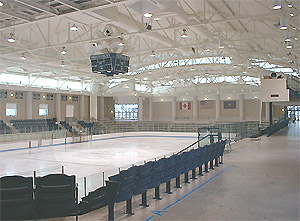As we approach the 23rd NCAA Division III Men’s Ice Hockey Championship Tournament this weekend, it is time to reflect on some of the history of the event, particularly as it applies to the storied history of Middlebury College.
This is the fourth time that Middlebury has hosted the big dance. The first, in 1995, started the Panthers on their run of five consecutive national championships, and the second in 1997 was in the middle of that span. These two tournaments were held in Duke Nelson Arena, an old World War II aircraft hangar that was scavenged from Sampson Air Force Base in upstate New York in 1948. While “The Duke” was a cozy rink, it was very cold in the snowy Vermont winters and was not suited to host a national-level tournament either from the spectators, players, or media perspectives.
“Nelson Arena had its charm as a great old hockey arena,” said Middlebury Sports Information Director (SID) Brad Nadeau. “But as an SID, it was flat-out miserable. We had to build all kinds of scaffolding towers in the corner to fit the media in.”

Then in 1999, the Chip Kenyon ’85 Arena was opened, and suddenly the Panthers went from an old, charming rink to one of the most modern and state-of-the-art facilities in all of Division III college hockey. Kenyon Arena sports spacious seating, wide aisles, and extensive concessions for the fans. The media enjoy one of the largest press boxes at this level of hockey and also wireless internet access throughout the arena. The players utilize modern locker rooms and well thought out training facilities.
Hosting an event like the National Championship Tournament can take much more than just having a top-notch ice rink. Planning must start months in advance, when potential schools put together a bid for hosting the event and submit it to the NCAA. This bid must take into account facilities, ticketing, security, media, spectators, NCAA requirements, souvenir sales, and a long list of other little details.
It is those little details that can make or break the success of a tournament. One of Nadeau’s many responsibilities this week is to ensure that each of the media representatives have their needs met. During a normal weekend, Kenyon might see one or two radio stations and a videographer for each team. This weekend, there will likely be more than twenty media representatives from print, radio, video, and internet covering the event, plus requirements from the NCAA to record video and audio for every on ice session.
“There is a great deal more media attention for this tournament than most of the year,” said Nadeau. “I prepare a media list and make sure that all of their needs are met. One thing we have going for us is Kenyon Arena. It opened in 1999 and is just an amazing rink. It is nice to not have any makeshift type facilities in place for this. We also setup a whole room for press conference purposes, with all of the little touches that make it nicer for the people involved.”
The Middlebury team and players don’t escape the pressures of hosting an event either, although head coach Bill Beaney tries to limit the impact. During the week, the phone is constantly ringing as friends and family try to arrange for tickets, or simply call to wish the team luck in the games. But in its fourth go around, Middlebury has hosted this tournament more than anyone else and is starting to get the process down to a science.
“We have gotten to where everyone knows their role in hosting stuff, and we are to the point where coach Beaney can concentrate on coaching his players for the games,” said Nadeau.
That experience in hosting could be an important factor in limiting the impact of hosting to the team. Historically, the team hosting the national tournament hasn’t faired very well in the category that matters most, taking home the hardware.
The last time a host school won on home ice was Norwich in 2003. All told, the host team has only won six championships out of the 22 held. (This total discounts the 1987 title that Plattsburgh won on home ice but later vacated.) But then again, Middlebury is the only team to win the title on home ice twice in the history of the tournament.
For teams hosting playoff games, this year is shaping up to be even worse than most. Only a single host team won during the NCAA Quarterfinal round, and that was Middlebury. The other three teams that advanced to this weekend all did it on the road.
In league playoffs, the trend was a little more favorable for the home-standers, but not by much. Four of the eight teams hosting their respective league finals were victorious.
While fans and players hope all season long to be playing in the NCAA tournament, and to do it at home, the jury is still out on whether it is truly an advantage or not. Are all of the extra distractions and preparations too high a price to pay for the chance to play or watch in your own rink? You will have to decide that for yourself.
If hosting a national tournament is old hat for anyone, it is Middlebury. With the help of their excellent staffs, both Beaney and Nadeau will try to make this a tournament to remember for everyone who attends.


